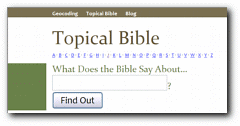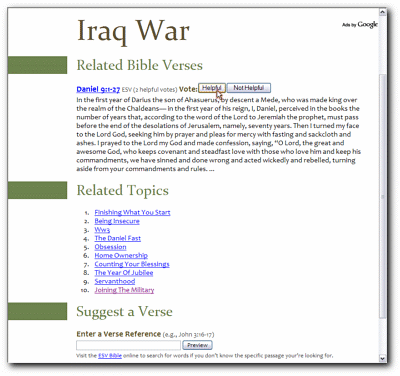OpenBible.info just launched a new topical Bible service that is steeped in crowdsourcing-mashup-web-2.0 goodness. Since I just blogged about the “old school”What the Bible Says About… service from Logos I thought I’d give this upstart service a mini-review.
You can try it out:OpenBible.info Topical Bible
Here’s how it works: The developerscompiled a topic list using Yahoo! Related Suggestions, then searched Yahoo! for the most relevant web pages about each topic, then pulled any Bible references from those pages. So what you end up with is a list of Bible verses that are most closely associated with a particular topic across the web.
The label next to the “find” box says, “What does the Bible say about…” But I think it’s a stretchto say this service helps you find out what the Bible says about a topic. It would be more accurate to say you’re finding out what people say the Bible says about a topic. Or maybe what people say about the Bible when speaking about a topic. And by people I mean “the people.” The OpenBible.info project is truly trusting in the wisdom of crowds.
Admittedly, any topical indexto the Bible involves editorial decisions and inferences. Orville James Nave (1841-1917), who spent 14 yearsworking on his project to”…note and classify everything found in the Scriptures”, certainly did not work in a vacuum. (The New Nave’s Topical Bible used at What the Bible Says About and available inside Logos Bible Software is a revision of Orville Nave’s classic work.) But he was methodical, thoroughand consistent in his appproach to the task.
Don’t get me wrong, though, I do think there’s value to a service like the OpenBible Topical Bible.
What I like about it:
- It offers current topics. If you want to find out what people say the Bible says about Harry Potter…you can.
- It offers a constantly-growing list of topics. If you enter a topic that’s new to the database, the topic is added and you’ll get some initial results after a few moments of waiting for the server to do its work. I entered “Iraq War”, which was brand new to the database.
- It offers a constantly-improving data set. The Helpful/Not Helpful buttons by each Bible verse or passage allow me to help fine tune the results, while the Suggest a Verse box lets me associate a verse to my topic.
Suggestions:
- Allow the user to associate a new topic with an existing topic. I found later that “War” (of course) and “The War in Iraq” are both existing topics. Before adding “Iraq War” as a new entity, the service could ask, “Did you really mean ‘The War in Iraq’?” and learn from my response. In this way, I would be training the database to understand that the two terms mean the same thing.
- I don’t know what method the Topical Bible service uses to identify Bible verses onweb pages, but it seems to me such an undertaking is fraught with perils. Sean Boisen has raised some good questions about this in the context of counting Scripture references in blog posts. Since the web is full of unruly data (unlike the carefully tagged bookswe work on here at Logos) the only solutions seem to be a) push people to adopt something like Bible reference microformat standards or b) develop ever-smarter verse extraction routines.
All in all this is a pretty cool service and I’m sure we’ll see more like it in the days to come.






